B-horror nostalgia: Ryan Schifrin’s Abominable (2005/2018)
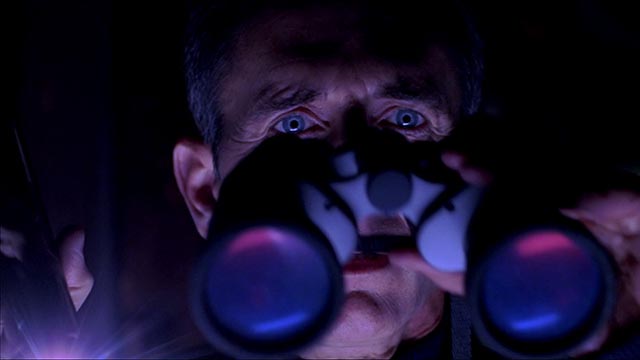
I’ve been familiar with Kim Newman’s work for years – that is, his work as a critic; I haven’t read any of his novels. He used to write a regular column for the late lamented Video Watchdog, which like his pieces in numerous other magazines tended to focus on the discovery of some obscure movie which deserved wider recognition. He’s even more familiar now as a presence on genre disk releases, often in tandem commentaries with Alan Jones as well as on-screen interviews. It was a no-brainer then to pick up a copy of Video Dungeon, a fat volume of short reviews culled from decades of Newman’s contributions to various magazines.
Containing more than five-hundred reviews, many just a paragraph or two, none much longer than a page, as the title suggests it generally aims quite low, seeking out the cheap and little-noticed contributions of filmmakers working far down the production scale. Arranged into a number of categories, the reviews tend towards repetition – who knew there were so many variations on the Frankenstein story which fall outside the mainstream canon? And structurally the book ends on an extended and exhausting note of monotony with brief descriptions of cable channel mutant shark movies which eventually blend into an indistinguishable mass which has little to offer other than an occasionally amusing title which the actual movies predictably fail to live up to.
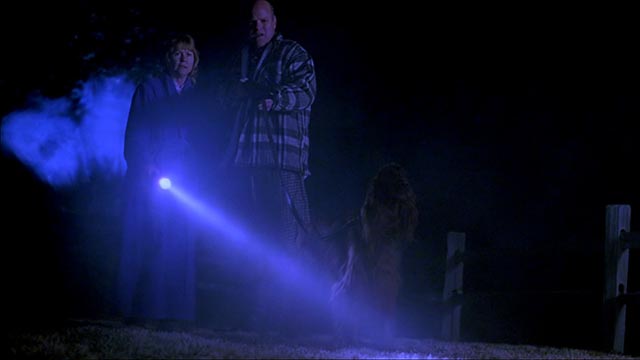
Video Dungeon is not a book to sit and read cover to cover; it is, however, ideal bathroom reading, and I spent several months working through it. The repetitiveness would no doubt have been mitigated if I’d just dipped randomly, but I read it sequentially – a self-inflicted ordeal. Which is not intended as a criticism of Newman; it’s just a consequence of the nature of the book, which is best viewed as a guide to the barrel-scrapings of genre filmmaking. Newman’s observations are often amusing, but read all together you can sense his own exhaustion in devoting so much time and effort to movies which he’s watched from a perverse completist impulse.
The real value of the book, though, like his columns, is in unearthing from this undifferentiated mass of mediocrity those movies which aspire to something more and occasionally, despite limited resources, do rise through their makers’ efforts and talent to become at times interesting and in some cases even worthwhile to seek out.
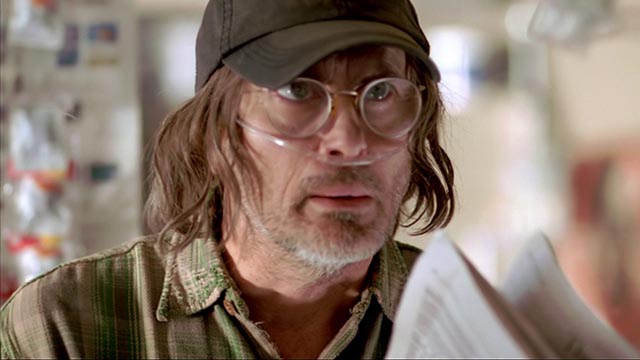
The first fruits of this were borne out on New Year’s Eve, when my friend Steve and I settled down after the annual big family meal to see in the new year by watching a horror movie. This year it was a movie brought to my attention by Newman. I found a used copy of the Blu-ray soon after reading his comments and I probably wouldn’t have paid it any attention if not for his favourable remarks. It’s a Bigfoot movie called Abominable (2005), written and directed by Ryan Schifrin, the son of the great film score composer Lalo Schifrin.
Bigfoot movies traditionally aren’t particularly good – from The Legend of Boggy Creek (1972) on, they often take a pseudo-documentary approach drawing from the famous Patterson-Gimlin shaky super-8 clip of a tall, shaggy figure loping through the California woods. Then there’s William Dear’s lame family comedy Harry and the Hendersons (1987), which domesticates the famous cryptid. There are essentially two broad approaches to this kind of myth: while one sees the animal as a dangerous representative of nature’s untameable threat to humans weakened by civilization (Bobcat Goldthwait’s exemplary found-footage horror, Willow Creek [2013]), the other sees something noble and majestic threatened by base human cruelty (The Abominable Snowman (1957), Val Guest’s adaptation of a Nigel Kneale television play).
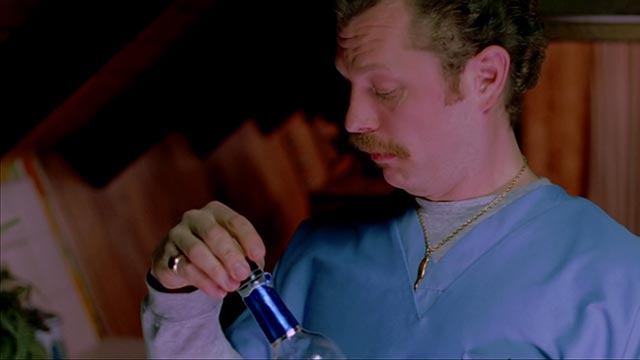
Ryan Schifrin isn’t concerned with deeper philosophical issues; his creatures are savage killers preying on weak humans in a remote, mountainous part of California (mostly shot around Idyllwild in the San Jacinto Mountains). If there seems to be something generic about Abominable, it’s not surprising. Schifrin set out to make an ’80s-style horror movie. The danger in such pastiche is always misjudging the tone – too many filmmakers lean towards mocking the source, assuming a sense of superiority towards the material, using irony to make sure the audience knows they don’t actually take this stuff seriously. Schifrin doesn’t fall into that trap.
As a writer, Schifrin begins where too many don’t; he creates interesting characters who by their presence give the threat posed by the monsters some dramatic weight. By the time the two surviving characters are desperately fighting for their lives, it matters. You want them to get through this. And in getting through it they change and grow – not as characters in high drama gain vital self-knowledge perhaps, but more than we’re often given in movies like this where characters tend to be made of thinly cut cardboard which is just pushed around for plot purposes. (Because Schifrin keeps close to his protagonist’s point-of-view, the women next door are not given as much depth – and perhaps this is where the film comes closest to its ’80s models; they’re present to be victims, their deaths witnessed by a man struggling with his own fears.)
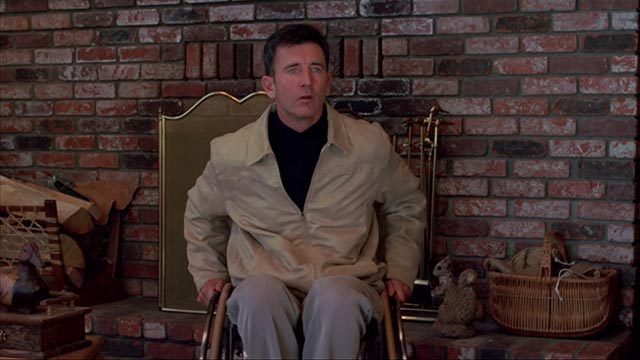
Schifrin sets the mood with a prologue in which a farmer and his wife (Rex Linn and genre royalty Dee Wallace) hear noises in the night and, going to investigate, find one of their horses torn to pieces; sounds and movement in nearby woods make them retreat quickly back to the house, where they cower as something large and heavy snuffles around the door. When things grow quiet, the farmer cautiously opens the door and discovers very large footprints in the fresh snow below the porch.
Following this, we meet our protagonist Preston Rogers (Matt McCoy). He’s being driven back home by a smug, unempathetic man named Otis (Christian Tinsley) six months after being crippled in a terrible mountain climbing accident in which his wife died. Preston’s doctor has sent him back to the scene in an effort to help him get past the trauma, but Preston doesn’t feel ready … and Otis’ goading just aggravates his stress.
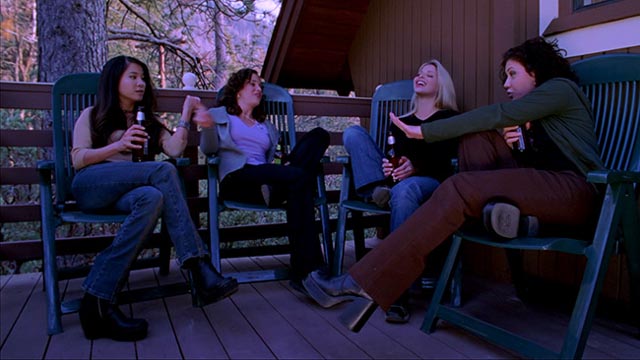
Stopping for gas, Otis encounters a classic grisly local who offers the usual veiled warnings. This character is played to the hilt by Jeffrey Combs; eyes distorted behind thick-lensed glasses, chain-smoking despite being hooked up to an oxygen tank by a line running to his nose. This guy signals that Schifrin is not just aware of the conventions, but is also going to go that extra distance to breathe life into them. We immediately get the sense that he loves this genre and is determined to honour it rather than make fun of it.
Once they reach Preston’s home – an expensive chalet perched on the mountainside, which immediately poses a problem for the paraplegic because it has to be entered via a steep staircase which Otis must carry him up – Preston is left alone because Otis forgot to pick up some necessary supplies (specifically soy milk because Preston is allergic to dairy, another nice little detail to signal his vulnerability). Preston now finds himself surrounded by reminders of his former life and his dead wife. His anxiety is reflected in an ominous rhythmic sound and vibration like heavy footsteps, which resolves into the thumping bass coming from a Jeep which pulls up between his house and the one next door, disgorging five young women who’ve come for a fun weekend together.
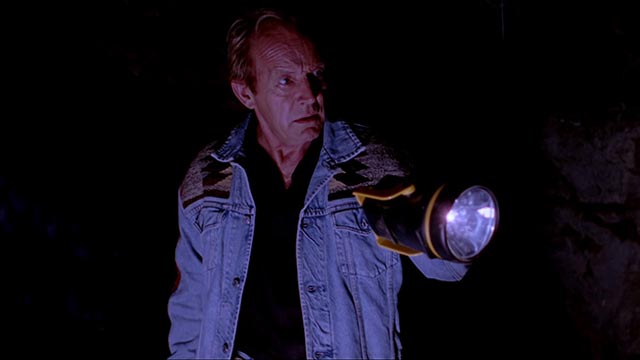
Here Schifrin sets up the classic ’80s slasher trope – attractive young women in an isolated location primed to become victims of some unseen killer. Onto this, he grafts his final narrative ingredient: an homage to Alfred Hitchcock’s Rear Window (1954). The wheelchair-bound Preston can only access the world outside his windows with a pair of binoculars. His fear makes him search for threats; but his voyeuristic behaviour makes him look like a creep to the neighbours. When he glimpses one of the women, on her cellphone at the bottom of the drive, apparently snatched away by something large, his efforts to alert her friends just amplify their suspicions that he’s a pervert.
Preston knows something bad is happening, but like the boy who cried wolf, he is brushed off by everyone – the women next door, the police he tries to contact via email (the phones are out, of course, something having torn down the lines), and particularly Otis, the attendant sent by Preston’s doctor, who resents being stuck for the weekend with what he considers a pathetic, hysterical basket case. Before facing the real threat from outside, Preston has to save himself from Otis who is determined to sedate him.
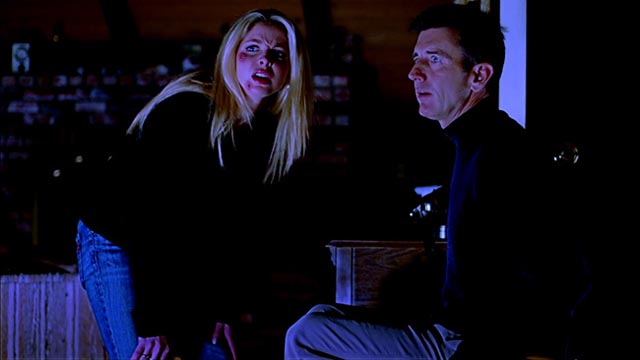
The claustrophobic tension building around the two neighbouring houses is briefly abandoned when attention moves to the woods where Farmer Hoss from the prologue has gone with the guy from the gas station and another friend, a hunter named Ziegler (Lance Henriksen), looking for whatever killed the horse. Their drinking and bickering provides some well-judged, character-based comedy relief, but what happens to them also ramps up the menace and provides a hint of what the as-yet barely glimpsed creature is capable of.
This creature is finally revealed clearly as Preston helplessly watches its deadly assault on the women next door in a bravura, sustained sequence of escalating violence. When one of the women, Amanda (Haley Joel), manages to escape to Preston’s house, he rediscovers through fear his will to live and has to call on his former skills as a mountain climber to help himself and Amanda escape the monster. They must work together to overcome the threat – which takes a heavy physical toll on both of them.
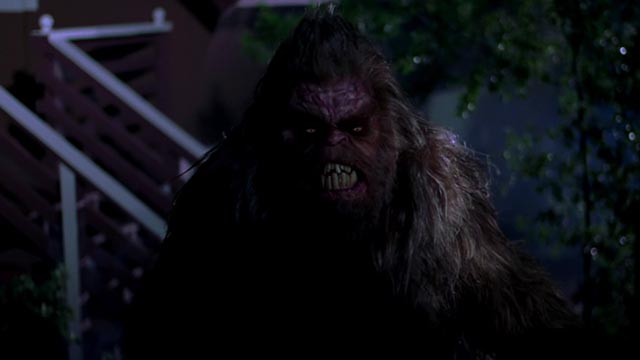
In a final gesture of respect for his characters and the audience, Schifrin doesn’t subject them to a cynical ending, saving the final kicker for some secondary characters who have perhaps earned their fate because of their refusal to believe the menace was real.
Abominable is a tense little B-movie, well-crafted, with a good cast who take things as seriously as the writer-director, supporting the escalating mayhem with better-than-average performances. The icing on the cake is an excellent monster, in both design and execution, which inflicts gruesome damage on its victims with judiciously applied practical gore effects.
*
Abominable has been released on Blu-ray by MVD Entertainment Group as part of their Rewind Collection, designed to evoke memories of cult VHS releases. (Their catalogue has no particular focus, ranging from D.O.A: Rite of Passage to Savannah Smiles to Bright Lights, Big City and Attack of the Killer Tomatoes.) These disks are pretty expensive here in Canada, close to forty bucks on Amazon and even higher if you can find them in a store; even my used copy of Abominable cost $24.99 … but it’s a substantial package and turned out to be worth that much anyway.
The dual-format set is packed with extras which fill in the interesting backstory of the production. Originally shot on 35mm in 2004-05, the movie was never completed on film. The negative was scanned to DigiBeta and post-production was finished on video for a DVD release. There were minor digital effects (mostly adding some life to the creature’s eyes), but essentially everything was done practically, on set. And then the technology evolved, resolutions increased and DigiBeta quality began to look like VHS, so the film slipped out of sight.
Reviving it for a new hi-def release proved quite problematic. Although the negative was rescanned in 2K, the original editing lists had been lost. Editor Chris Conlee returned to the project and had to import the original DVD image and then by eyeball replace every shot individually by hand to reconstruct the cut with the new hi-def image. There were no alterations in the edit itself, allowing for the use of the original audio track (designed and mixed at Skywalker Sound as part of a program to help out low-budget filmmakers). Though the 2018 version runs two minutes shorter than the 2005 version, this is due to a speeded up credit roll, not to any structural changes.
The disk includes both the new scan and the original lower res version, which has more muted colour and weaker blacks. Apart from this quality difference, the only substantial change was to the minimal CGI elements; in the new version, Schifrin decided not to repeat exactly what had been done in 2005, but rather to go back to the original design concept and give the creature smaller, beadier eyes, which have the effect of making the head look even larger and – more importantly – less cartoonish. It’s a small, but significant change.
Schifrin provides this information in a video introduction (8:35), while an account of the original production is provided by a making-of featurette from 2005 (37:15). There’s also a commentary track from Schifrin and actors Matt McCoy and Jeffrey Combs which adds detail to the story. There are several deleted scenes (6:14) and a blooper reel (4:09). There are galleries with posters, stills and storyboards, plus a couple of trailers. And finally we get Schifrin’s black-and-white USC student film Shadows (8:08) and a more recent short, Basil & Moebius: No Rest for the Wicked (2011, 16:16).
MVD’s Abominable is an impressive package showcasing a small genre movie made by people who really cared about what they were doing. I’m glad Kim Newman pointed me towards it.
Comments
I really like Abominable when I saw it on the SyFy channel back in 2008 and that was the edited no nudity version. Then I forgot about it until 2015 when I picked up the DVD. We watched it on Friday Night Movie night and it was well received. That’s something as we’re a harsh bunch of jaded old farts who complain a lot. I thought it was one of the better Bigfoot films. Most of them suck. I was glad to see that the Blu-ray doesn’t have any extras I can’t get by without. The commentary was entertaining. It’s a movie I would watch again.
Of course, “better Bigfoot film” is a pretty low bar, but I thought Abominable was made with both skill and sincerity, making it quite enjoyable. And I’m a pretty “jaded old fart” myself!